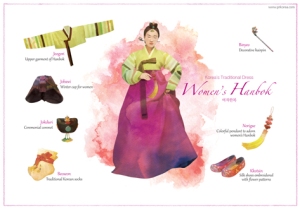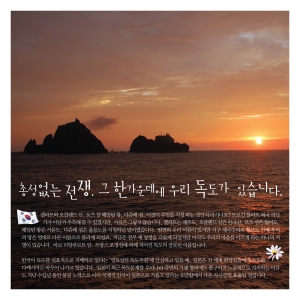This postcard includes two of the most important islands in Korea, traditional Korean clothing (Hanbok), Korean food, Korean holidays, the Korean alphabet, and lastly traditional Korean paper.
Through this postcard you can learn about Korean history, food, and people all in one place. You can also download this postcard and share with your friends the diversity and depth of the Korean culture!
Together let’s share our countries uniqueness through this cultural postcard!
Dokdo, Korea’s Eastern Island
Dokdo is Korea’s easternmost volcanic island that consists of two main islands. In 1905, Dokdo became the first Korean territory to be affected by Japan’s imperialism. Today, Dokdo strengthens our will to protect peace and freedom by reminding us of Korea’s history. This postcard also has some of unique animals found on Dokdo’s and other unique traits on the island.
Korean Traditional Dress – Women’s Hanbok
Hanbok is Korea’s traditional dress. When the Hanbok is worn, the multiple folds of fabric create an elegant volume which is comfortable for all body types. Because of its loose fit Hanbok is suitable for traditional Korean lifestyle, which is sitting on the floor. Women’s Hanbok consists of a long-sleeve top and a voluminous skirt with a underskirt and trousers underneath. Depending on a person’s social status and occasions, Hanbok was adorned with various accessories, such as a hairpin, a coronet, and a pendant.
Korea’s Food – Bibimbap
Bibimbap is one of Korea’s most popular dishes, and has begun to be recognized globally. Bibimbap is made by mixing rice with an egg, red pepper paste, and assorted vegetables. Depending on the region and the ingredients, there is a wide variety of Bibimbap in Korea. In this food postcard you can see some of the ingredients that go into making Bibimbap.
Hanguel
Hanguel is the native Korean alphabet invented by King Sejong (1397-1450) in 1443 during the Joseon Dynasty (1392-1910). During the time King Sejong invented Hanguel, it was called “Humminjeongeum” which means proper sounds to instruct the people. Hundreds of years later the purpose and principles of invention are still explicitly known to us since the Hunminjeongeum manuscript was published with a commentary. The manuscript is even listed on UNESCO’s Memory of the World Register. King Sejong created Hanguel for the common people who could not afford to learn the difficult Chinese characters used by the nobles. Now, Korea has the lowest illiteracy rate in the world due to simplicity of Hanguel.
Download this postcard here
http://data.prkorea.com/?p=4724
If you reside in Korea you have the opportunity to subscribe to this website. Then by doing so you can receive VANK’s materials for free!









